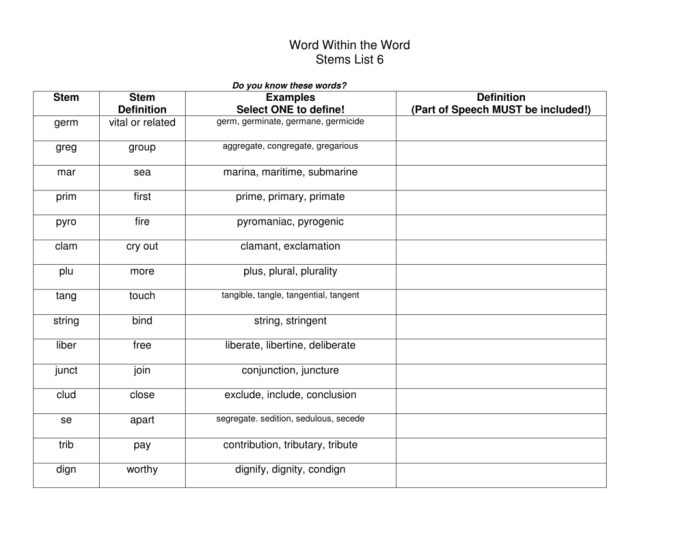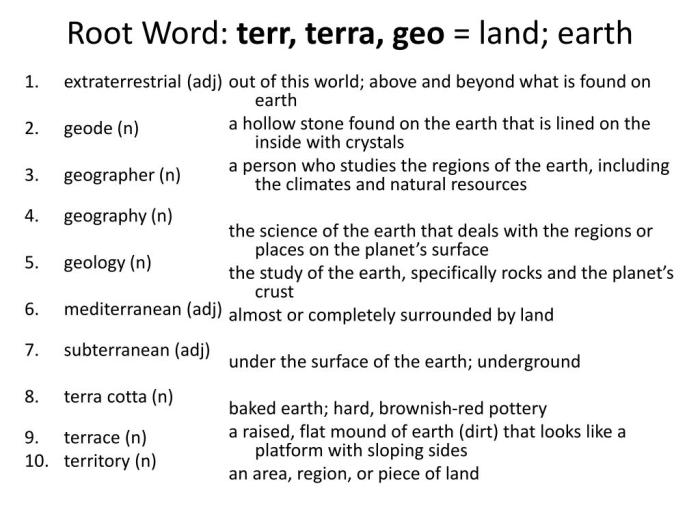Words with the stem terr, derived from the Latin root meaning “earth,” encompass a diverse and intriguing group of terms that have shaped human language and thought throughout history. From the mundane to the extraordinary, these words paint a vivid picture of our relationship with the natural world and the complexities of human experience.
Their etymological origins, semantic nuances, and morphological variations provide a rich tapestry of linguistic exploration, inviting us to delve into the depths of human communication.
Etymology of Words with the Stem Terr

Words with the stem terr originate from the Latin word “terra,” meaning “earth” or “land.” This root word has given rise to numerous English words related to the earth, its inhabitants, and its characteristics.
Semantic Field of Words with the Stem Terr
Words with the stem terr encompass a diverse semantic field, covering concepts such as:
- Land and its features (e.g., territory, terrain)
- Earth and its inhabitants (e.g., terrestrial, subterranean)
- Fear and trembling (e.g., terrify, terror)
- Earthly and worldly (e.g., terrestrial, subterranean)
Parts of Speech and Morphological Variations of Words with the Stem Terr

Words with the stem terr can belong to various parts of speech, including nouns, verbs, and adjectives. The table below organizes some examples:| Part of Speech | Word | Example ||—|—|—|| Noun | territory | The territory of the kingdom was vast.
|| Noun | terror | The terror of the storm kept us indoors. || Verb | terrify | The news terrified the entire village. || Adjective | territorial | The animal was very territorial and guarded its food. |The most common suffixes used with the stem terr include
- ory,
- or, and
- ify. These suffixes typically indicate a noun, agent, or action, respectively.
| Suffix | Function | Example ||—|—|—||
ory | Noun | territory, dormitory |
|
or | Agent | terror, error |
|
ify | Action | terrify, horrify |
The most common prefixes used with the stem terr include dis-, ex-, and sub-. These prefixes typically indicate negation, removal, or a lower degree, respectively.| Prefix | Function | Example ||—|—|—|| dis- | Negation | disoriented, disorganized || ex- | Removal | exterminate, extract || sub- | Lower degree | subterranean, subtle |Morphological variations of words with the stem terr can occur through the addition of suffixes, prefixes, or both.
For example, the word “territory” can be modified to “territorial” by adding the suffixial, or to “disoriented” by adding the prefix dis-. These morphological variations allow for the creation of new words with different meanings and functions.
Historical Overview of the Usage of Words with the Stem Terr

Words with the stem terr have a rich and varied history, dating back to the Latin word terra, meaning “earth” or “land.” In the Middle Ages, the word “territory” was used to refer to a region of land under the control of a particular lord or ruler.
Over time, the meaning of the word expanded to include any area of land, regardless of its political status. Today, words with the stem terr are used in a wide variety of contexts, from geography to law to everyday conversation.
Evolution of Meaning
The meaning of words with the stem terr has evolved over time, reflecting the changing ways in which people have thought about the relationship between humans and the land. In the early days, the word “territory” was used to describe a physical space that was owned or controlled by a particular group of people.
Over time, the meaning of the word expanded to include more abstract concepts, such as the rights and responsibilities that come with owning or controlling land. Today, words with the stem terr can be used to refer to a wide range of concepts, from the physical space of a country to the intangible rights and privileges that come with citizenship.
Cultural and Linguistic Factors
The usage of words with the stem terr has been influenced by a variety of cultural and linguistic factors. In some cultures, the concept of land ownership is very important, and words with the stem terr are used to describe the boundaries and rights associated with owning land.
In other cultures, the concept of land ownership is less important, and words with the stem terr are used more broadly to describe any area of land. The language that a person speaks can also influence the way they use words with the stem terr.
In some languages, the word for “territory” is very specific, while in other languages it is more general. This can lead to misunderstandings when people from different cultures use the same word to describe different things.
The words with the stem “terr” are often associated with fear or terror, but they can also have more positive connotations. For example, the word “terrace” refers to a raised outdoor area, often with a view. In a similar vein, the Beta Theta Pi chapter at UT Austin is known for its commitment to fostering a sense of community and belonging among its members.
This is reflected in the fraternity’s motto, “For God, Country, and Yale,” which emphasizes the importance of faith, patriotism, and education. The words with the stem “terr” may often have negative connotations, but they can also be used to describe positive and uplifting concepts.
Example Sentences

Words with the stem terr are commonly used in various contexts to convey ideas related to fear, horror, or anxiety. Here are a few example sentences demonstrating their usage:
- The terrified child clung tightly to her mother’s hand as they walked through the dark forest.
- The horrific accident left the survivors with lasting emotional trauma.
- The constant terror of being pursued made it difficult for the refugees to find peace.
- The terrible news of the earthquake sent shockwaves throughout the country.
- The terrifying monster lurked in the shadows, waiting for its prey.
Concept Mapping and Semantic Categorization of Words with the Stem Terr

Creating a concept map can visually illustrate the relationships between different words with the stem terr. This can help us understand how these words are connected and how they fit into the broader semantic field of “earth” and “territory.”
Semantic Categories of Words with the Stem Terr
Words with the stem terr can be organized into several semantic categories, including:
- Land and Territory:words related to land ownership, boundaries, and geographical areas, such as territory, terrain, and terrestrial.
- Earth and Nature:words related to the earth and its natural features, such as earth, earthling, and extraterrestrial.
- Fear and Horror:words related to fear, terror, and trembling, such as terrify, terrifying, and tremor.
Cognitive and Linguistic Processes Involved in Words with the Stem Terr
Understanding and using words with the stem terr involves several cognitive and linguistic processes, including:
- Semantic Processing:The brain processes the meaning of words with the stem terr, including their semantic categories and relationships to other words.
- Morphological Analysis:The brain analyzes the morphological structure of words with the stem terr, including their prefixes, suffixes, and root words.
- Lexical Retrieval:The brain retrieves words with the stem terr from its mental lexicon, based on semantic and morphological cues.
FAQ Compilation
What is the etymology of the stem terr?
The stem terr originates from the Latin word “terra,” meaning “earth.”
What is the semantic field of words with the stem terr?
Words with the stem terr cover a wide semantic field, including concepts related to land, territory, fear, and horror.
How have words with the stem terr evolved over time?
The meaning and usage of words with the stem terr have evolved over time, influenced by cultural, linguistic, and historical factors.